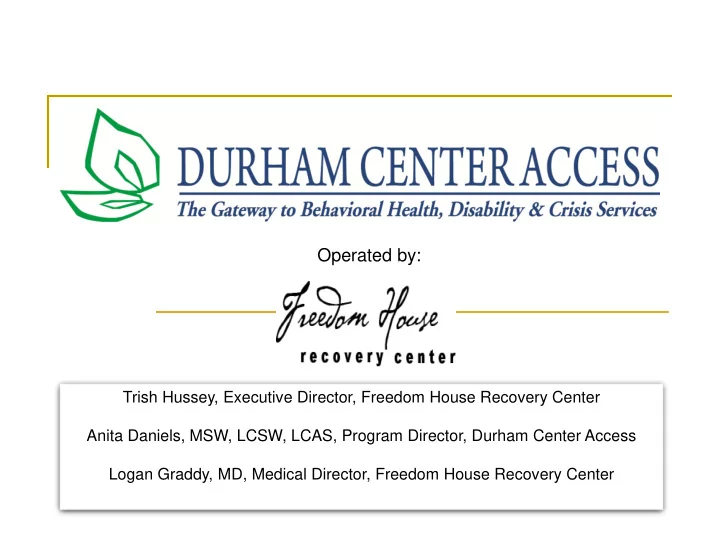

Operated by: Trish Hussey, Executive Director, Freedom House Recovery Center Anita Daniels, MSW, LCSW, LCAS, Program Director, Durham Center Access Logan Graddy, MD, Medical Director, Freedom House Recovery Center
Durham Center Access Mission Durham Center Access (DCA) is the gateway to all of the local mental health, developmental disability and substance abuse services that are part of Durham System of Care. Goals Reduce state hospital utilization Support community-based treatment Coordinate with outpatient providers to maximize consumer benefit and continuity of care in crisis events Stabilize the consumer and reintegrate into the community Assist individuals with accessing care who are not engaged.
Durham Center Access Services 24-hour crisis facility for individuals experiencing a crisis 16 facility based crisis beds – short-term stabilization for adults – alternative to inpatient hospitalization. 11 23-hour crisis evaluation observation rooms (one for juveniles) – short-term intensive intervention to stabilize acute or crisis situations Telephone and face-to-face screening, triage and referral to community providers
Durham Center Access Services Crisis risk assessment Mental Health and Substance Abuse assessment Psychiatric and Petition evaluations Non-hospital medical detoxification service Target Population: Citizens of Durham County Provider: Freedom House Recovery Center Start Dates: July 2004 July 2006 - Freedom House contracted August 2008 - DCA moved to Crutchfield Street December 2008 – DCA became a state approved IVC facility
Durham Center Access Outcomes 23-hours Crisis Evaluation Observation Average Number Admitted per month 200 Average Length of Stay 20 hours Average Utilization Rate per month 60%
Durham Center Access Outcomes Facility Based Crisis Average Number Admitted per month 125 Average Length of Stay 3.5 days Average Utilization Rate per month 86% Reducing unnecessary admissions to the State Hospital
Durham Center Access Individuals Diverted From State Hospitalization Monthly 40 35 34 92% 30 27 84% 25 23 23 22 21 20 72% 85% 20 85% 20 81% 100% 17 95% 17 17 16 77% 53% 15 63% 89% 13 50% 10 3 1 1 2 2 5 1 0 11% 0 0 0 0 0 3% 0 3% 4% 11% 5% 0% 0% 0% 0% 0% 0% 0% 0 Aug Sept Oct Nov Dec Jan Feb Mar Apr May June July Aug Other Agency Initiated Petitions (e.g., private hospitals) DCA Initiated Petitions
Durham Center Access % Homeless and Unemployed Served at DCA by Month 100% 85% 82% 82% 82% 82% 80% 76% 77% 80% 75% 69% 68% 60% 60% 40% 40% 32% Homeless 31% 30% 29% 28% 29% 26% 25% 24% 24% 24% 24% 20% 21% Unemployed 0% Aug 11 Sept 11 Oct 11 Nov 11 Dec 11 Jan 12 Feb 12 Mar 12 Apr 12 May 12 Jun 12 Jul 12 Aug 12
Walk-in Clinics Office-based outpatient services for adults, children and adolescents Immediate screening/assessment and brief, intensive interventions to resolve crisis and preventing admission to more restrictive level of care Service provided face-to-face (DCA - anchor site) or via telepsychiatry (4 satellite clinic locations) Start date: December 2008 Initial LME Alliance: The Durham Center, OPC (Orange- Person-Chatham), and Alamance-Caswell.
Walk-in Clinics Target Populations and Eligibility Criteria Children and adults from the identified catchment areas in need of psychiatric services AND: Discharged from State hospitals, private psychiatric hospitals, and community hospitals and are unable to secure a timely appointment in the community; OR Are currently NOT being served in the Provider Network and need immediate psychiatric assessment and care, medication evaluation and aftercare planning; OR Are being actively served by a provider, and are presenting with needs exceeding reasonable capacity beyond which the provider is able to provide.
Walk-in Clinics
Walk-in Clinics Outcomes/Goals Improve accessibility of urgent care services for individuals experiencing psychiatric and substance abuse difficulties Reduce the need for consumers to go to emergency departments Reduce the need for admissions to hospitals for consumers who can be served in the community Provide better structure for the coordination of care Provide an alternative to emergency departments for law enforcement officials interacting with consumers in distress or on petition.
Durham Center Access Key Community Partners Durham County Government, Alliance, and Freedom House Recovery Center Magistrate Law Enforcement – Durham Police Department - CIT Program, Durham County Sheriff Durham Provider Network with First Responder Responsibility Emergency Departments – Duke, Durham Regional, VA EMS
Durham Center Access Resources for Community Hospital Eds External Resources Alliance Hospital Liaison Mobile Crisis Team Provider Network, especially ACTT and IDDT The Crisis Center: If the consumer will contract for safety, move to lower level of care. SOC to explore hospital diversion/community hospital beds. Internal Resources Duke , DRH and the VA have Social Workers in the ED to manage care for MH/DD/SA Consult with Psychiatry if possible Re-evaluation of petitions Limited Resources Delays in access to care due to limited resources, such as, law enforcement transportation and hospital beds.
Contact: Anita Daniels, MSW, LCSW, LCAS, Program Director 309 Crutchfield Street Durham, NC 27704 Email: danielsa@durhamcountync.gov Phone: (919) 560-7305 Fax: (919) 560-7478 Mobile: (919) 428-5318 Websites : http://www.freedomhouserecovery.org http://www.alliancebhc.org/consumers-families/crisis-and-access/crisis-facilities
Recommend
More recommend